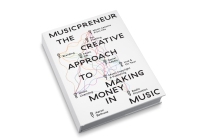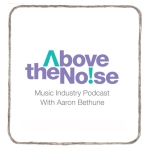 Michael Perlmutter is a Music Supervisor and owner of instinct entertainment. He finds songs for films, TV shows, docs. and commercials. He loves music. He loves the arts. And, happy to admit, the Toronto Maple Leafs.
Michael Perlmutter is a Music Supervisor and owner of instinct entertainment. He finds songs for films, TV shows, docs. and commercials. He loves music. He loves the arts. And, happy to admit, the Toronto Maple Leafs.
He has been asked to speak/moderate on panels at various conferences including: MIDEM (Cannes), Winter Music Conference (Miami), Billboard Dance Music Summit (NYC), NXNE (Toronto), ECMA Music Conference (Maritimes), Atlantic Film Festival (Halifax) and CMW (Toronto).
Send music anytime. instinctentertainment.ca
Michael is definitely one of those cool music industry guys. I would trust him with my songs because I get the feeling he cares.
Along with talking about the music we’ve been listening to and the amazing line up for this years Coachella festival, we managed to squeeze in some of my nosy questions about the music business, specifically music licensing.
Thanks again Michael! Aaron Bethune.
Interview with Michael Perlmutter
How did you get started in the music and entertainment business?
How much tape do you have? It’s serendipitous. My very first job in the entertainment business was a PA for the movie Short Circuit 2, remember “Number 5 is alive”? Well, that was me. I wasn’t the robot, I got hired as a PA and I worked with the robotics team. Later on, I was on an airplane and I met a gentlemen who owned an advertising agency in Toronto. Six months later, his VP hired me and within a year I started working on the CPI business. CPI was Michael Cohl’s company and they were the biggest concert promoter in Canada and Michael turned out to be the biggest concert promoter in the world. I worked on all the concerts that he promoted across Canada, which was an amazing opportunity for a young lad like me. I really dug it. I’ve always loved music, as we all have, and I wanted to get into the business. I told my boss I was leaving to get a job in the music business. I had nothing lined up, so he thought I was absolutely out of my mind. I did finally get a job at EMI Music Publishing for 18 months before some lay offs. Fast forward a little bit, I went back to the ad agency and I worked on the U2 ‘Pop’ tour in 1997. Then I got a phone call from Sam Feldman’s company, a woman named Janet York who said she’d heard nice things about me from Steve Herman and Mike McCarty, and Janet interviewed me when she came to Toronto. The Feldman office in Toronto was looking for a music supervisor and I guess I passed the test, and I was there for 8 years. In March of ’06, I started this company, instinct entertainment, and I have been doing music supervision for a solid five years, in addition to a lot of other things.
Are you able to say what some of those other things are that you do?
I co-produced and co-created a music event called The Side Street Project. We take three bands, put them on one stage, and watch them collaborate on cover songs. The artists, for Volume 1, are Buck 65, Holy Fuck and Emm Gryner; the three cover songs are Def Leppard’s “Pour Some Sugar on Me”, “State Trooper” by Bruce Springsteen, and “The Wreck of the Edmund Fitzgerald” by Gordon Lightfoot. It is a 45-minute show that includes footage of the dinner, rehearsal and sound-check. Check out the trailer, you might dig it. http://www.thesidestreetproject.com/promo.html
Has being a music supervisor changed how you listen to music? Has the business changed the music?
The biggest change is the quantity of music out there. The quality has also changed, and there’s a lot of great music out there! It’s easy to discern between good and great. A lot of people realize they now have the chance to do music at home or on a weekend, even if they’re not full-time musicians. Think of all of the home audio and video apparatus and technology that people can muster and record their own stuff. Now, the technology allows everybody to make music. And yes, when everybody makes music some of it’s not going to be very good. But you get a lot of experimental music, people doing really interesting stuff and for a music supervisor, the more interesting, the better. For example, there is a band I love, an instrumental band called Off The International Radar, and I would love to find them spots for their songs…I just haven’t yet. Brand new, unique – you never know what will happen with an artist – who knew what was going to happen with Peaches! She became an internationally acclaimed artist. Her music is very particular, and it’s not necessarily for every kind of production. She had a song in “Lost In Translation,” in the strip bar, and it was quite prominent and fantastic. I love the idea that people are being creative, so that to me is one of the biggest changes in the business – the creative part.
On the business side, the biggest change is that the fees to licence music are not as large. There is a great desire to have songs used as opposed to being protective of them. With the increase in the number of artists, independent labels, and music pitching companies…people want their songs to be used. Granted a Lady Gaga song is not going to go for $10,000. But she’s a massive artist. There are a lot of artists out there, and they’re selling records and they’re playing shows, but they’re not selling 2 million records or a million or even half a million, but they’re still doing well. Those artists want to get their songs out there, because the audiences are there. A show in the States could have 10-12 million people watching it. That’s a lot of eyeballs focused on a song in a scene.
How do you give value to music?
That’s an excellent question. There is an idea that the value is not necessarily a dollar figure but a marketing tool and long run benefit. We could say you’ll get a lot of exposure – and the old adage is, “you could die of exposure.” But, you know what? Not necessarily in this day and age. There is so much competition. I try to make the best argument that I can, but if it is going in a show, and if nobody’s ever heard of you, then the value is that people are going to hear your music. If an artist doesn’t want to take $500, there is another artist who will say yes.
We all think there’s only one song for a scene and I would agree in a lot of cases. We’ve had to replace songs because we weren’t able to strike deals, and it’s sometimes better in the eyes of the producer or myself.
Do you take into consideration more than just the music?
One concern I would have is that I wouldn’t necessarily put an 82-year old artist in a youth show. We’d like the youth who are watching a show like “Degrassi” to connect with the artists. I mean, yes, if it’s an old Frank Sinatra tune and it is really cool, then yes, but it doesn’t happen very often – we’re not using a lot of speed-metal on “Degrassi”.
Our concern is does it feel right? Is it lyrically good? Is it good production? Does it say something? Does it have a heart? A lot of “feel” goes on with respect to how we choose tunes, as opposed to if the artist has sold records or not.
Is there any difference between film and TV?
There is a big difference, absolutely. The main difference is the time frame. TV is weekly, so it’s like working on a mini-film every week. When we worked for 5 years on “Queer As Folk”, it always felt like we were working on it year in and year out – mind you there’s a little bit of break between each season, but an extraordinary amount of paperwork all year round. It was a very intensive music show, and we had 18-23 episodes a year and each show had 10-12 songs in it. Every week we were supervising a ‘film’. We would give the editors tons of music to work with and, luckily, we had a really great budget with Showtime and the producers, Temple Street, – we could use almost any song we wanted to. But with that kind of work load, and song choice, and negotiation every two weeks, it was insane. With some of these songs, you have to deal with three publishers or record labels. You’ve got to make sure everyone’s happy and within budget. So over five years, we used 1,000 songs, and spent 7 million bucks. “Degrassi” is similar, yet uses mainly independent songs. They made 46 episodes this past season, and sometimes it was 2 episodes every 10 days. Once you get into the routine, it doesn’t feel like a lot, but from the outside, people think you’re nuts.
With a film, you might have 12 months. I worked on a hip-hop film called Beat the World that was just finished, locked, delivered in December, 2010. We began in March, 2009. It was a good 18-20 months of work. Interestingly enough, budgets changed, and when the budgets changed some of our choices had to change. So we were down to the wire in the last couple of weeks before the mix, choosing a couple of as replacements. We produced a few original recordings – K’ Naan was featured on one with KRS-One – but that was all done in the last few months. You’ve got time to be creative, and you can change your mind a little bit if you need to, or come up with new ideas but for the most part, TV is just a treadmill, and it doesn’t stop for 6-7 months at all.
Is it more likely you will pay more attention to artists sending their music to you directly or is it in their best interest to go through a library or company?
To each his own: If an independent artist has the time to make connections, then that’s great. We get a lot of submissions from the artists themselves or their managers. But I love pitch companies; they have great taste. Remember, if you’re going to be represented by a pitch company, that they may have 300 bands on their roster – what kind of attention are you going to get? I would suggest you speak to the pitch company and see where you’re going to sit on their roster. Maybe have a four-month tryout. Granted they might not get you a gig or placement in four months, as it’s really hard, but you want somebody to work hard for you and not just be another artist on the shelf.
Does this mean you don’t need to look for music if you’re getting this many submissions?
We’re always looking for music. We’re always seeing who is out there. We look into unknown bands, email them or go to see them play live. We like to expand our network monthly, so we listen to the artist that we do work with and will continue to work with, but we also want new music. We all know that TV shows and films would love to get an artist before anybody’s ever heard of them. That’s happened in Grey’s Anatomy and EA Games and all that.
For example, an artist sent me a link to her music. It was 5 o’clock and I wanted to listen to some music at the end of the day – we pitched one of her songs for Degrassi. I didn’t know her from hole in the wall. The song went on Degrassi – she was thrilled and had an amazing amount of feedback after it aired. Facebook, MySpace, people buying her stuff, the whole thing. That makes us proud, and the TV shows love that stuff, because it adds credibility to what they’re doing.
These artists have to be their own marketing department: they have to understand the business. Even if you get a manger, you need to understand the business. I don’t think anybody understands everything but at least understand different parts of deals or contracts and create your own PR and marketing tools.
In your own words, what is licensing and what is its process?
When a music supervisor licences a song, there are two rights. There is a master recording right and there’s a publishing right – most of the time called the ‘sync.’ right. So, we’re synchronizing your song to picture, whether it’s film, TV, commercial, video game or documentary. The owners of certain rights may be different people. If you’re an independent artist – you wrote all the songs yourself, recorded the songs, and paid for it yourself – you own the master recording and the sync. rights.. So, if I’d like to licence a song, I ask the artist, do you own the master recording? – “Yes I own the master recording; I made this record by myself.” Did you write the songs? – “Yes, I own the song, I wrote it so I’m the writer and I own the publishing”. Then, I send you a one-page ‘deal memo’ that states we’re going to use this song in a scene, it’s going to be for the world, it’s going to be on a TV show, it plays for about a minute, and the scene is in a bar, and we’re going to give you a thousand dollars. For a TV show, that would include all TV media, (all cable, pay, video-on-demand, any specialty TV, a bus, on a train, on a plane) non-theatrical, which means hotel rooms and educational videos and all that kind of stuff, and also DVD and internet downloads. The only money the artist gets upfront is the $1,000. The artist decides whether he wants to do it, hopefully he says yes, we send the artist a deal memo with all these points on it, they sign and give it back to us. Subsequently, we create two contracts, one for the master and one for the publishing. It’s a fairly standard 3 or 4 page contract which has all those rights with some legalese in there. Then you sign that, and we pay you. That’s basically a licensing deal.
Is there really a space for music supervision to expand and give work to people who want to be music supervisors?
I was at a conference in Miami about 10 years ago and I was sitting with a woman who pitches music to Supervisors etc. She’s from New York, her company’s called ZYNC. They had 50-70 people sitting in the audience at this conference and it was all about music supervision and how to get your songs into film and TV. She said music supervisors are the new ‘A&R’ scouts. It’s a different kind of job now. There’s so much content out there – TV, film, commercials, video games, documentaries, all around the world – and because there’s so much content, there is room for more supervisors.
I think it’s a job of passion, creativity, negotiation and dealing with clients, musicians and with the recording industry. I love the idea of hearing something great, and making sure more than 15 people will hear it.
There aren’t many younger folks in the Supervision business (in Canada) because there aren’t many opportunities for young people to learn. I think that in music supervision there could be more mentorship. I know a couple of companies have younger people working with us, which is great because one day somebody’s not going to hire me at 75 years old to supervise a teen show ;).
When you listen to a song, how much of the song do you actually listen to?
It’s a secret…we can listen to 10 seconds, 30 seconds or the whole song – it all depends what we’re looking for. Sometimes the lyrics aren’t a priority as we’re looking for a feel for a background at a club, as long as it’s not anything offensive. It really depends on the scene – for a really nice montage of an emotional scene, we’re going to listen to at least a couple of minutes because we have to feel it/hear it from start to finish.
Good vocals and good production are very key. After listening to a lot of music over 19 years, you can tell pretty quickly. If a music supervisor listened to every single song from start to finish, we wouldn’t get our job done.
How do music supervisors get paid? Are music supervisors building their own catalogue that can then be licensed out?
I’ve thought long and hard about having a publishing company. To have your own catalogue of music, let’s say it’s Michael Perlmutter Publishing, and I have 30 songs to pitch, yes, the client doesn’t necessarily have to know. If the song’s right, then it’s fine and it doesn’t matter who owns it. Sometimes it seems unethical. Maybe I’m way too pure at heart, and that’s fine. There’s a band called “The Pains of Being Pure At Heart”…that’s me (ok, not all the time). There could be some financial and creative pain by being so pure at heart by not having a publishing company and expanding the business…but I will now consider it.
The way we get paid is through a fee from the production. For TV, it’s on an episode basis; for film and documentaries, it’s flat. There’s another thought out there – that a few people have asked me about – “When you place a song by an independent artist for $1000, don’t you take a little cut?” I can’t take a cut. I just don’t feel that I can do that.
For more information and to contact Michael please visit his company here: www.instinctentertainment.ca
















Great interview, thanks for sharing!
Really enjoyed the interview, thanks a lot guys.
Great interview, really enjoyed it!
Wow this is a great article. I’m sitting next to a box of my new CDs and I really needed some guidance. Thanks!
I am glad it has proven useful! I can recommend the interviews with David Hayman, Greg Debonne, Ron Proulx, Jonathan Simkin and Ariel Hyatt if you are wondering how best to go about getting your music in peoples hands (and ears!).
saweetness. thanks again!
Pretty nice post. I just came across your blog and wanted to say that I’ve really liked reading your blog on Interview.
I’m glad that you have found the interviews insightful and appreciate your feedback!
We appreciate you sharing this article.Really thank you!
I do these interviews with the hopes that people like yourself enjoy them:) There are some new posdcasts with interviews coming soon! Thanks for reading.